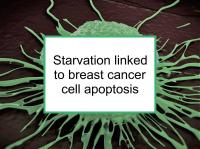Fasting has been shown to protect normal cells from the toxic effects of chemotherapy and radiotherapy while sensitizing fast-growing cancer cells to treatment. Normal cells enter a dormant state as a result of fasting, whereas cancer cells attempt to keep growing and dividing, exposing them to the cytotoxic effects of treatment.
Fasting contrasts to some other strategies that decrease side effects but at the cost of potentially reducing the effectiveness of treatment. Now a new study has reported a mechanism that helps explain the effects of intermittent fasting during breast cancer treatment.
Fasting and overeating during cancer treatment
It has been suggested that a schedule of fasting two days before, during the day of, and one day after chemotherapy could enhance its treatment efficacy while providing protection against toxic side effects. However, this regimen needs further study before it can be recommended.
One study in which rats were deprived of protein during anthracycline chemotherapy reported that protein malnutrition reduced the elimination of both doxorubicin and epirubicin, prolonging the exposure of the heart to the drugs and increasing the anthracycline-associated heart damage.
While fasting during chemotherapy should only be undertaken with the clear permission and supervision of your oncology team, if at all, it is clear that overeating is to be avoided. Gaining weight during chemotherapy is associated with increased risk of breast cancer recurrence and metastasis. While nausea and other side effects often reduce appetite during the first few days after each treatment, some women do gain weight as a result of overeating during the other portions of their chemotherapy cycles.
Large meals that result in sharp increases in circulating insulin cause effects in the body that are essentially the opposite of fasting. This includes meals heavy in refined carbohydrates or that result in a feeling of extra fullness. Feelings of hunger should be allowed to develop between meals.
Latest research finds link between fasting and cancer cell death
The study referenced at the beginning of this news story was designed to elucidate the mechanism of action by which short-term starvation improves cancer treatment efficacy and can also delay cancer progression in the absence of chemotherapy. The authors demonstrated that REV1 is essential to these effects. REV1 is a DNA polymerase. Most DNA polymerases are enzymes that help assemble DNA molecules. However, REV1 has a specialized role in DNA repair that has been determined to be important in both genome maintenance and cancer development.
The authors found that REV1 links nutrient sensing and metabolic control to cell survival. REV1 can bind to the tumor suppressor p53 and regulate its activity. Short-term starvation modifies these interactions. p53 is a tumor suppressor protein encoded by tumor suppressor p53 gene. Activation of p53 results either in the death of the cell by apoptosis (programmed cell death) or survival of the cell by cell cycle arrest and DNA repair. Under starvation, REV1's inhibition of p53 is reduced. In fact, starvation enhances p53 activation (through REV1) and p53-mediated apoptosis in breast cancer and melanoma cells.
The authors conclude that fasting, through its effect on REV1, is a promising strategy to increase p53-dependent programmed cell death and to increase the effectiveness of cancer treatments.
Please see our article on fasting during chemotherapy for more information.
